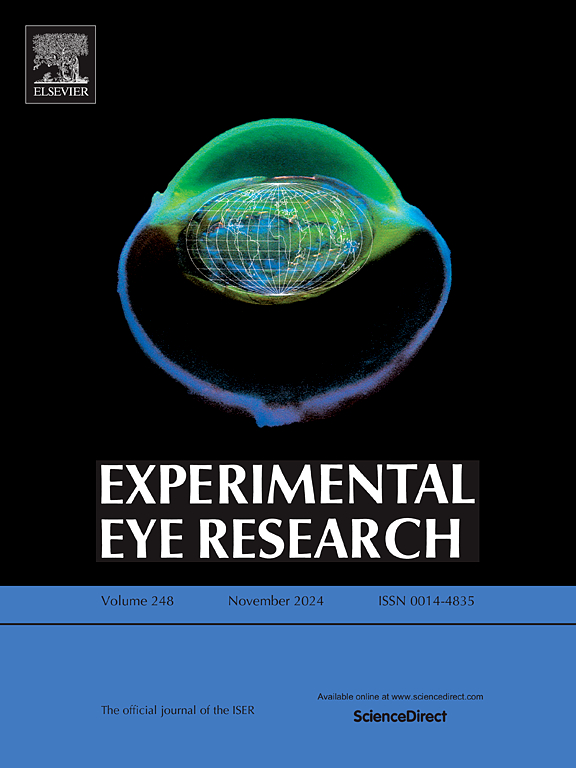Human induced pluripotent stem cell-derived extracellular vesicles promote neuroprotection effects in rat optic nerve crush model
IF 3
2区 医学
Q1 OPHTHALMOLOGY
引用次数: 0
Abstract
Optic neuropathies significantly contribute to permanent vision loss, frequently characterized by the deterioration of retinal ganglion cells (RGCs) and axonal loss. Current therapeutic strategies remain insufficient. Induced pluripotent stem cell-derived extracellular vesicles (iPSC-EVs) have surfaced as a compelling substitute for stem cell therapies. Our study evaluates the neuroprotective effects of iPSC-EVs in a rat optic nerve crush (ONC) model. iPSC-EVs were isolated and characterized. The intravitreal (IVT) injections of iPSC-EVs or PBS were performed. RGCs survival was assessed at 7 and 14 days post-injury. Axonal regeneration was evaluated via anterograde labeling. Apoptosis of RGCs was detected using TUNEL assay. Retinal morphological changes and visual function recovery were assessed. Transcriptomic changes in the retina were analyzed by RNA sequencing to investigate potential underlying mechanisms. Additionally, Western blot was conducted to evaluate the expression levels of components in the phosphatidylinositol 3-kinases/protein kinase B (PI3K/AKT) pathway. The IVT injections of iPSC-EVs significantly improved RGCs survival and reduced neuronal apoptosis. Optical coherence tomography (OCT) revealed preservation of retinal nerve fiber layer (RNFL) and ganglion cell complex (GCC) thickness, alongside reduced optic nerve atrophy. Functional recovery was evidenced by F-VEP and axonal regeneration was detected. Mechanistically, RNA sequencing and Western blot implicated the stimulation of the PI3K/AKT pathway. Our study shows that iPSC-EVs exert significant neuroprotective and regenerative effects in a rat ONC model, underscoring their promise as a novel treatment candidate for optic neuropathies.
人诱导多能干细胞来源的细胞外囊泡促进大鼠视神经损伤模型的神经保护作用
视神经病变显著导致永久性视力丧失,通常以视网膜神经节细胞(RGCs)退化和轴突丧失为特征。目前的治疗策略仍然不足。诱导多能干细胞衍生的细胞外囊泡(ipsc - ev)已成为干细胞治疗的一个令人信服的替代品。我们的研究评估了ipsc - ev在大鼠视神经压迫(ONC)模型中的神经保护作用。分离并鉴定了ipsc - ev。玻璃体内(IVT)注射ipsc - ev或PBS。在损伤后7天和14天评估RGCs的生存。通过顺行标记评估轴突再生。TUNEL法检测RGCs的凋亡。观察视网膜形态变化及视功能恢复情况。通过RNA测序分析视网膜的转录组变化以研究潜在的潜在机制。此外,Western blot检测磷脂酰肌醇3-激酶/蛋白激酶B (PI3K/AKT)通路组分的表达水平。IVT注射ipsc - ev显著提高RGCs存活,减少神经元凋亡。光学相干断层扫描(OCT)显示视网膜神经纤维层(RNFL)和神经节细胞复合体(GCC)厚度保留,视神经萎缩减轻。F-VEP显示功能恢复,并检测到轴突再生。在机制上,RNA测序和Western blot提示PI3K/AKT通路的刺激。我们的研究表明,ipsc - ev在大鼠ONC模型中发挥了显著的神经保护和再生作用,强调了它们作为视神经病变治疗的新候选药物的前景。
本文章由计算机程序翻译,如有差异,请以英文原文为准。
求助全文
约1分钟内获得全文
求助全文
来源期刊

Experimental eye research
医学-眼科学
CiteScore
6.80
自引率
5.90%
发文量
323
审稿时长
66 days
期刊介绍:
The primary goal of Experimental Eye Research is to publish original research papers on all aspects of experimental biology of the eye and ocular tissues that seek to define the mechanisms of normal function and/or disease. Studies of ocular tissues that encompass the disciplines of cell biology, developmental biology, genetics, molecular biology, physiology, biochemistry, biophysics, immunology or microbiology are most welcomed. Manuscripts that are purely clinical or in a surgical area of ophthalmology are not appropriate for submission to Experimental Eye Research and if received will be returned without review.
 求助内容:
求助内容: 应助结果提醒方式:
应助结果提醒方式:


